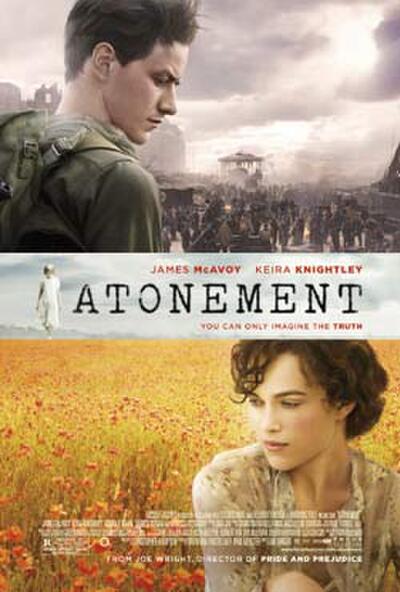🪖 We're So Sorry, Uncle Albert...
The Crime: Atonement
The Guilty Party: Joe Wright, but mostly Ian McEwan
Overview: A gorgeous and tragic period drama ends with a soul-crushing rug pull.
Why I Hate It...
Content warning for sexual assault, and oh by the way I need to spoil the ending in order to discuss it.
Atonement is a 2007 period film directed by Joe Wright based on a 2001 novel of the same name by Ian McEwan. It's a moody period piece that balances stories of lost love with jealousy, tragedy, and guilt into a gorgeous tableau. Cinematographer Seamus McGarvey creates painterly vistas that juxtapose the bleak horror of war against small moments of beauty. It received rave reviews for its texture and nuance--and it's acting, which included a star-making turn from a then 13-year-old Saoirse Ronan. It was nominated for seven Academy Awards, including Best Picture. It was one of the most highly-regarded films of its year.
And oh my god, I hated it so much!
The movie follow Briony (Ronan in the early scenes, Romola Garai after a time-jump) who, as a child, falsely accuses her older sister's beloved of raping their cousin. The accusation is not malicious, as Briony did walk in her on her cousin being raped, but an earlier misunderstanding caused her to point the finger at the wrong person. The accused, Robbie (James McAvoy) goes to prison for four years and is conditionally released to join the military so he can be cannon fodder in World War II. Briony's sister Cecilia (Keira Knightley) becomes a nurse and serves at the front in hopes of reuniting with him. Briony follows her sister to war in nurse training, wanting desperately to make some kind of amends. She eventually realizes that the actual perpetrator was now married to that same cousin--big ick there--and goes to her sister to apologize. She finds Robbie there on leave, living with Cecelia, and the couple flat out refuse to forgive her. Oh, and it will be virtually impossible to overturn Robbie's conviction, especially now that their cousin is married to her rapist and cannot testify against him, but Briony vows to do everything she can to set matters right.
All well and good. And not really my thing, if I'm being honest. Oh, I could see that it was well-crafted, but 27-year-old Kurt was not the intended audience for this and I was just trying to keep on top of the Oscar buzz because I watched everything in those days. So when we got to the ending, with Cecilia and Robbie reunited if not exactly happy, and Briony contrite but denied forgiveness, it felt appropriate and I was good. It was a downer, but there was a glimmer of hope, and I was ready to move on to the next flick.
And then the movie kept going. It cuts to the present day where yet a third actress (Vanessa Redgrave) plays Briony as an elderly successful novelist giving an interview, in which she reveals that the ending we'd just seen was all a lie. They didn't actually end up together because Robbie died of sepsis in Dunkirk and Cecilia drowned in a London subway tunnel during the Blitz. Briony had fictionalized a "happy" ending, but her "atonement" was to come clean about it, effectively teasing the audience with that glimmer of hope and then taking it back, smashing it into the carpet, and lighting it on fire.
Reader, I was incandescent with rage. This was a storyteller deliberately messing with his audience in order to make us feel worse, even beyond the scope of a standard tragedy pulling on heart strings. I actively resented this movie, because it violated the entertainment contract. Movies allow us to experience huge emotions at a safe remove, so we can process love or grief or terror without having to fully succumb to them. But Atonement pierces that veil with a meta-textual knife that is aimed square at your gut. And I am not here for it.
Incidentally, this ending is lifted directly from the novel, and even though I didn't know the idea originated with McEwan, I absolutely guessed that it was based on a novel because these are the kind of meta shenanigans that you can really only get away with in literary fiction. And yes, I'm aware that meta-fiction is still fiction. And yes, I accept that my reaction is perhaps not 100% rational. I don't care. This movie pulled a fast one on me for no other reason than to prove that it could make me feel more miserable than I was prepared for, and I'm allowed to still be upset about that 15 years later.
Next week we're switching it up. Instead of a good movie I hated, we're going to look at Sucker Punch, a bad movie that I actually kind of enjoyed.
In CONSUMED WITH HATE, Kurt is revisiting media that he absolutely did not like one bit. See more posts.

Comments